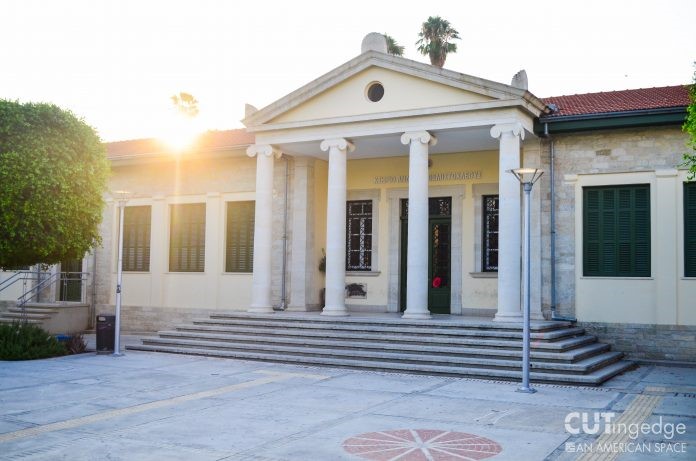The Cyprus University of Technology and in particular the Ecotoxicology Research Group, participates in a programme, funded by the Ministry of Health, under the auspices of the Department of Environment, Veterinary Services, and Customs, in partnership with the Food and Agriculture Organisation (FAO) and the International Atomic Energy Agency (IAEA).
The programme involves the release of sterilised mosquitoes with the goal of eliminating an invasive species of mosquito that has been identified in the country.
In 2022, the Ecotoxicology Research Team confirmed the presence of the Aedes aegypti mosquito, also known as the Yellow Fever Mosquito, in Cyprus. Specifically, a year earlier in 2021, they sought the support of the IAEA to develop a national rapid response strategy to prevent the establishment of the Aedes albopictus mosquito on the island.
During a mission to Cyprus as part of the technical cooperation programme, IAEA experts confirmed the findings and the presence of the most dangerous Aedes aegypti mosquito. After receiving the emergency response plan from the IAEA, Cyprus informed the organisation that the Aedes albopictus species had also been detected.
Following two additional missions by experts in October 2022, a report was submitted to Cyprus providing recommendations for mosquito delimitation, and an emergency response plan was submitted in December.
The specific species, Aedes aegypti, can transmit dangerous diseases such as yellow fever, dengue fever, chikungunya virus, and Zika virus. Mosquito-borne diseases cause over 700,000 deaths annually worldwide. Therefore, the presence of these two species in Cyprus poses an immediate threat to public health, the healthcare system, and the economy in general in the event of an outbreak of any of these diseases.
Rafael Mariano Grossi, Director-General of the IAEA, stated, “The presence of these two invasive mosquito species poses significant challenges for Cyprus, and if Aedes aegypti is not eliminated, it could have serious consequences for the whole of Europe.”
He also added, “[t]he pilot action of the Sterile Insect Technique (SIT) provides a solution, the success of which will have broad benefits for Cyprus and the world.”
The Sterile Insect Technique (SIT) has been selected as the most suitable method to support the eradication of harmful mosquitoes in Cyprus. As part of the technical cooperation with the IAEA, batches of 100,000 mosquitoes will be released every week until the end of the year as part of the pilot programme.
The SIT technique was developed in the late 1950s for the management of harmful insects and is environmentally friendly. The process involves collecting the target insect population and then mass-rearing them. Male insects of the species are then sterilised using ionising radiation, similar to the machines used in hospitals and medical centres. The sterilised male insects are then released into the environment to mate with the female individuals in the natural populations. As a result, sterile eggs are produced, leading to a significant reduction in the insect population size or even its elimination.
This method has been used for decades to manage agricultural pests such as the Mediterranean fruit fly, the false codling moth, the New World screw-worm, and the tsetse fly. Regarding mosquito eradication, successful efforts have been recorded with the nearly 100% elimination of Aedes aegypti in Cuba in 2020 and Aedes albopictus in China in 2017. In Europe, the technique has been used since 2000 in many European countries, including Italy, Portugal, and Germany.
The Cyprus University of Technology, along with the Department of Chemical Engineering and the Department of Civil Engineering and Geomatics, is cooperating with the Ministry of Health and the Health Services, providing technical support and training to the involved personnel. The Minister of Health, Dr Popi Kanari, stated, “We are aware of the threat posed by these invasive mosquito species, especially Aedes aegypti, and we are making significant efforts to prevent their spread.”
Although the date of entry of the invasive mosquitoes is not yet known, experts estimate that as long as the area of spread remains limited, it can be eliminated using the SIT technique.
The Ministry of Health in Cyprus is implementing supplementary mosquito control measures, including removing the breeding sites of the larvae, treating the public sewage system, and targeted insecticide spraying in authorised areas.
As part of these supplementary efforts, Herodotos Herodotou, Head of the Health Services of the Ministry of Health in Cyprus, stated, “We have informed the public about the actions we are taking to eliminate the insect. We are conducting door-to-door inspections to educate and inform about the measures that can be taken to reduce potential mosquito breeding sites, in order to prevent the multiplication of Aedes aegypti and Aedes albopictus.”
The first batches of 100,000 sterile male mosquitoes are being sent by the FAO/IAEA Insect Pest Control Laboratory and were released on 14th June with the support of Dr Jérémy Bouyer, a Medical Entomologist at the Joint FAO/IAEA Centre. Each batch of insects will be released every week in a test area of approximately 0.5 square kilometres in Kiti. Bouyer stated, “The cooperation with the Ministry of Health and the Cyprus University of Technology was crucial for the preparation of this milestone pilot application.”
Source: Cyprus University of Technology | News (https://rb.gy/ji4ct)
